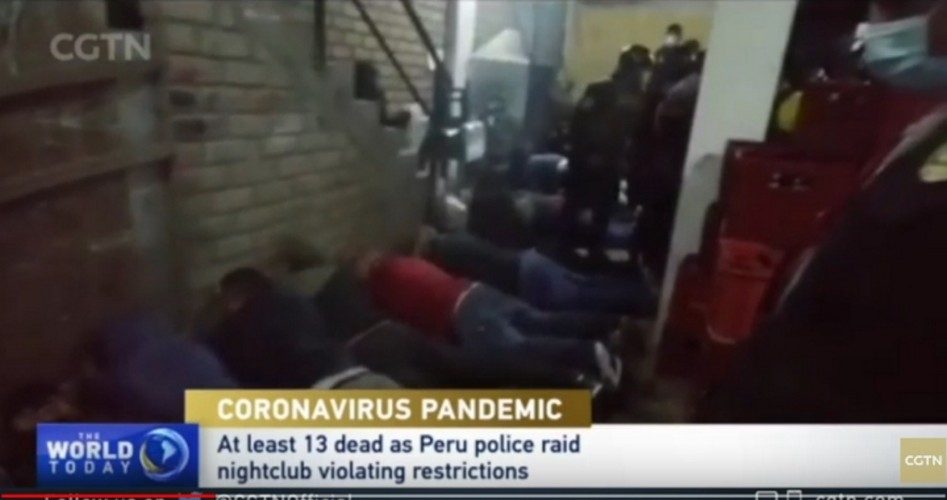
State-enforced lockdowns and social-distancing mandates are self-evidently obnoxious, contrary to natural human rights such as the rights to assemble, move, travel, and speak freely as one may wish, among other things. Moreover, they are potentially dangerous when the state’s police powers are used to enforce them.
This was proven in an unfortunately deadly fashion in Lima, Peru, on the evening of Saturday, August 22. That night, more than one hundred Lima residents gathered for a party at a night club located in an area that is not easily monitored by local authorities. According to the Associated Press, “The building in which the night club is located is dilapidated on the outside and is located in an industrial area in the Los Olivos district of Lima.”
Felipe Castillo, mayor of the area where the night club is located, said that “surveillance and supervision in the streets is ‘precarious’” in the area because of “the effects of the pandemic, which include a reduction in the collection of taxes.”
A natural place, then, for people trying to fly under the radar of authorities smitten with a lust for power to gather for a little fun.
Naturally, as demonstrated repeatedly around the world in the year of COVID tyranny, tinpot killjoy dictators had to swoop in and put an end to any festivities.
To that end, police stormed the night club where people were peaceably assembled and minding their own business.
{modulepos inner_text_ad}
The raid set off a panic among those in the crowd. Franco Asensios witnessed the raid and said it started at 9 p.m. According to Asensios, police told the crowd to let women in attendance exit the club first. But amid allegations of police gunfire and use of tear gas, the crowd stampeded to the exit.
“People got excited and started to go down, and then they said that the people in front were suffocating,” said Asensios, according to AP.
“People tried to escape through the only door of the second-floor disco,” AP noted, “trampling one another and becoming trapped in the confined space.”
Thirteen innocent people died needlessly as a result.
But that’s okay, according to Peruvian President Martín Vizcarra, since people should know better than to try to enjoy their natural rights when the government brazenly outlaws them.
“I feel sorry for the relatives … but also anger and indignation with the business people who organized the event,” Vizcarra said of the raid and the deaths.
The president is also demanding an aggressive investigation, not of the reason why the raid resulted in the violent deaths of 13 innocent people, but into the event’s hosts.
“We ask the Public Ministry to conduct a rigorous investigation and demand an exemplary punishment for the owners and organizers of this event,” Vizcarra demanded, according to ANDINA, the Peruvian news agency.
Peruvian Health Ministry bureaucrat Claudio Ramírez complained, essentially, that the night club gathering was pestilential. The party “was a breeding ground for the transmission of this disease, there was a viral load because it was a closed environment,” he said.
Video of the raid on the night club shows groups of people arrested laying face down and restrained on the floor, while police dressed in paramilitary garb load those arrested into the back of a small pickup truck.
Under Vizcarra, Peru has remained in a state of lockdown since March 15 and has had a mask mandate for much of that time. These policies have done nothing to prevent the spread of the SARS-CoV-2 virus in the nation.
Time magazine reported on Peru’s failed lockdown polices in late May.
“Peruvian president Martín Vizcarra declared a national state of emergency on March 15, when the country had just 71 confirmed cases of COVID-19,” Time wrote. “The order closed Peru’s borders and banned Peruvians from leaving the house except to access essential goods or perform essential work. It was one of the earliest quarantines in Latin America, and came in before lockdown orders in France, the U.K., and other European countries that were at the time far ahead of Peru in their contagion curves.”
But, Time continued, “it hasn’t worked.”
The Peruvian lockdown policy might not have worked to stop the virus, but like everywhere lockdowns have been put in place, it has worked to bolster the power of the government and its army of meddling bureaucrats over the natural rights, freedoms, prosperity, and well-being of the people.
Image: screenshot from YouTube video
Dennis Behreandt is a research professional and writer, frequently covering subjects in history, theology, and science and technology. He has worked as an editor and publisher, and is a former managing editor of The New American.




